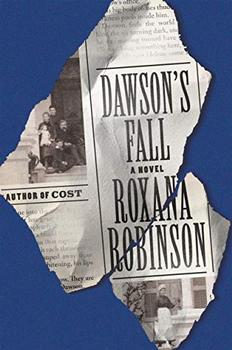
A cinematic Reconstruction-era drama of violence and fraught moral reckoning.
In Dawson's Fall, a novel based on the lives of Roxana Robinson's great-grandparents, we see America at its most fragile, fraught, and malleable. Set in 1889, in Charleston, South Carolina, Robinson's tale weaves her family's journal entries and letters with a novelist's narrative grace, and spans the life of her tragic hero, Frank Dawson, as he attempts to navigate the country's new political, social, and moral landscape.
Dawson, a man of fierce opinions, came to this country as a young Englishman to fight for the Confederacy in a war he understood as a conflict over states' rights. He later became the editor of the Charleston News and Courier, finding a platform of real influence in the editorial column and emerging as a voice of the New South. With his wife and two children, he tried to lead a life that adhered to his staunch principles: equal rights, rule of law, and nonviolence, unswayed by the caprices of popular opinion. But he couldn't control the political whims of his readers. As he wrangled diligently in his columns with questions of citizenship, equality, justice, and slavery, his newspaper rapidly lost readership, and he was plagued by financial worries. Nor could Dawson control the whims of the heart: his Swiss governess became embroiled in a tense affair with a drunkard doctor, which threatened to stain his family's reputation. In the end, Dawson―a man in many ways representative of the country at this time―was felled by the very violence he vehemently opposed.
"A stylish and contemplative historical novel, considerate of facts but not burdened by them." - Kirkus Reviews (starred review)
"The interspersed family letters and newspaper articles, while intriguing, seem spliced rather than woven into a narrative that leaps by years before settling on one fateful day in March 1889. But Robinson's descriptive and imaginative prose sings; this book is a startling reminder of the immoral and lasting brutality visited on the South by the institution of slavery." - Publishers Weekly
"Dawson's Fall is a remarkable achievement, a fully realized vision of a time and place long gone. I was astonished by the ease with which Roxana Robinson meshes the known and the imagined to make a texture utterly trustable and often stunning. Most of all I was impressed by the language of this book, at once restrained and powerful; the delight in detail; the telling word. This is masterful writing." - Josephine Humphreys, author of Nowhere Else on Earth
"Dawson's Fall grips us with fascinating characters, great and small, caught in the powerful unfolding of events that have shaped our country, and Robinson's own wise, clear-eyed, and heartfelt narrative." - Amy Bloom, author of White Houses
"The past springs brilliantly to life in this tragic and compelling story, as accurate and fully realized a depiction of daily life and the extraordinary events of this time as has ever been written." - Lee Smith, author of Dimestore: A Writer's Life
"She draws on letters, journals and newspaper articles about them and adds her own novelistic grace to make them come to life. With a fine eye for detail, she describes the horrors of the post-war period of racism and violence they could not escape." - Frances FitzGerald, author of The Evangelicals
"With complicated characters and a rich sense of time and place, this is an immersive tale about the meaning of America." - T. J. Stiles, author of Custer's Trials: A Life on the Frontier of a New America
This information about Dawson's Fall was first featured
in "The BookBrowse Review" - BookBrowse's membership magazine, and in our weekly "Publishing This Week" newsletter. Publication information is for the USA, and (unless stated otherwise) represents the first print edition. The reviews are necessarily limited to those that were available to us ahead of publication. If you are the publisher or author and feel that they do not properly reflect the range of media opinion now available, send us a message with the mainstream reviews that you would like to see added.
Any "Author Information" displayed below reflects the author's biography at the time this particular book was published.
Roxana Robinson is the award-winning author of six novels and three short story collections. Her fiction has appeared in The New Yorker, Atlantic, Harper's, and other publications. She lives in New York City and Connecticut, spends as much time as she can in Maine, and teaches in the MFA program at Hunter College.
Your guide toexceptional books
BookBrowse seeks out and recommends the best in contemporary fiction and nonfiction—books that not only engage and entertain but also deepen our understanding of ourselves and the world around us.